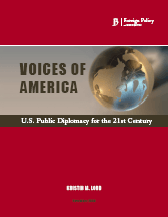Today I attended the presentation “Public Diplomacy 2.0” by the State Department’s Undersecretary for Public Diplomacy James Glassman at the New America Foundation. The presentation and discussion was on using web 2.0 technologies for public diplomacy, with a focus on specific examples, both within the State Department and in the wider world. Audio (MP3) and video of the event are both available.
Glassman focused a good deal on the “war of ideas”, basically idea that the U.S. needs to use public diplomacy (and strategic communications) more to encourage people to choose alternatives to violence instead of trying to make the U.S. more popular. Much as been written on this, so I will keep my notes in this area limited. Nonetheless, it is important to understand that much of the following was presented through this lens.
As I saw it, Glassman had two main points:
-
Not the technology: Public diplomacy 2.0 is not, and should not be, about the technology. Instead, public diplomacy 2.0 is a (somewhat) new process for communication and, more importantly, engagement. Indeed, Glassman noted that the State Department has long been doing web 2.0 style public diplomacy, just without (or with different) technology. He pointed to cultural exchanges and encouraging foreigners to study in the U.S. as exemplifying “web 2.0” type two-way engagement the U.S. government has long been involved with.
One of the primary examples Glassman gave of this point was the Columbian movement against FARC which, by utilizing the social networking site Facebook, put millions of people on streets around the world to protest against the rebel group. While he noted that Facebook was important to facilitate the marches, there had to be a preexisting enabling environment.
-
Web 2.0 gives the U.S. a significant competitive advantage: This new conversational medium gives the United States a significant competitive advantage over our opponents, most specifically Al Qaeda. Glassman’s argument is that the U.S.’s fundamental message (democracy, personal freedom, etc) is more compatible with the web 2.0 world than Al Qaeda’s (war of cultures, global jihad, etc). Ultimately, Glassman argues that, to be successful, Al Qaeda needs to control the message, which is not possible in the web 2.0 marketplace of ideas. To quote directly: “There is a reason Al Qaeda blows up marketplaces”.
To support this point, Glassman highlighted Al Qaeda’s difficulty with engaging on social networks and video sharing sites since that opens them up to direct criticism which then dilutes their message. In contrast, Glassman mentioned the Democracy Video Challenge, which encourages the public to submit a video on how they view democracy. Importantly, the winning video may not share the Department of State or U.S. government’s perspective on democracy.
 As most of the recent reports have argued, the United States government needs a coordinated public diplomacy plan that includes all agencies who are participating in this type of engagement. This is clear for a variety of reasons and pretty much universally accepted.
As most of the recent reports have argued, the United States government needs a coordinated public diplomacy plan that includes all agencies who are participating in this type of engagement. This is clear for a variety of reasons and pretty much universally accepted.